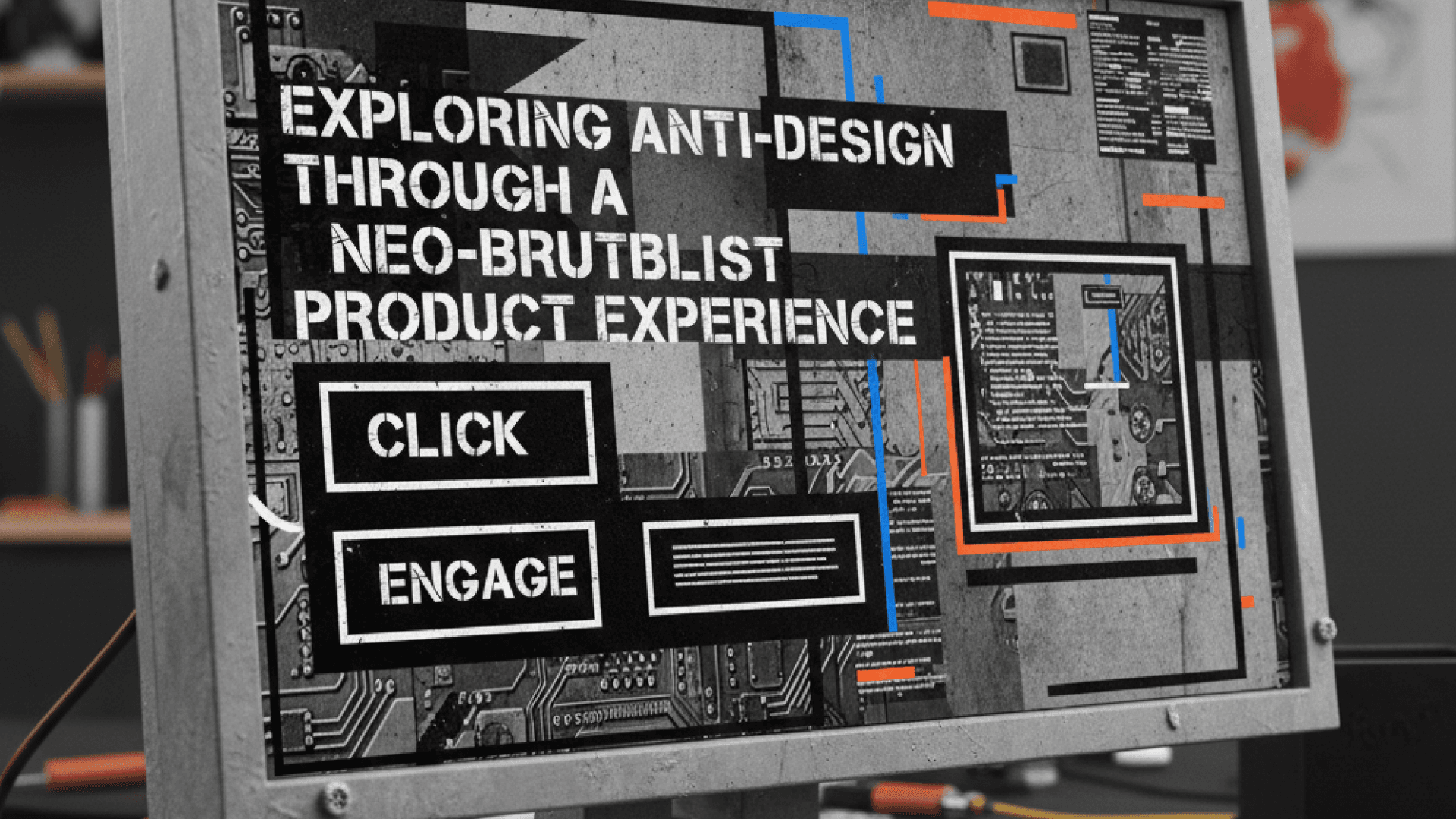How to Build a Chat and Messaging App from Scratch
Author

Subject Matter Expert

Date

Book a call
The chat and messaging app space is a crowded arena. According to Statista, the number of messaging app users reached 3.1 billion in 2023, a significant increase from 2.1 billion in 2019.
To win this market, your application needs to be robust and highly unique. How do you make it so? There are three key considerations to be analyzed before designing the chat app:
- Steps to be followed during the development process
- Customizability options in the chat app and
- Its viability in an already saturated market.
This blog will provide a detailed discussion of all the relevant aspects —
- Why are messaging apps still relevant
- Key features to include in your messaging app
- Steps to build a messaging application
- Current trends that you need to be aware of
- Costs of building chat apps for the popular players
Let’s get started!
Why Does It Still Make Sense to Create a Messaging App in 2025
In 2025, creating a messaging app remains a smart decision because communication is an indispensable aspect of our daily lives. Messaging apps have become the preferred medium for connecting with friends, family, and colleagues. These apps are versatile, enabling users to share texts, voice messages, photos, and videos, and even conduct video calls.
Here are three reasons why creating a messaging app is still a good idea in 2025.
I. An Expanding Market
Another reason why creating a messaging app still makes sense in 2025 is the expanding market. According to Statista, the number of messaging app users reached 3.1 billion in 2023, a significant increase from 2.1 billion in 2019. (source: Statista)
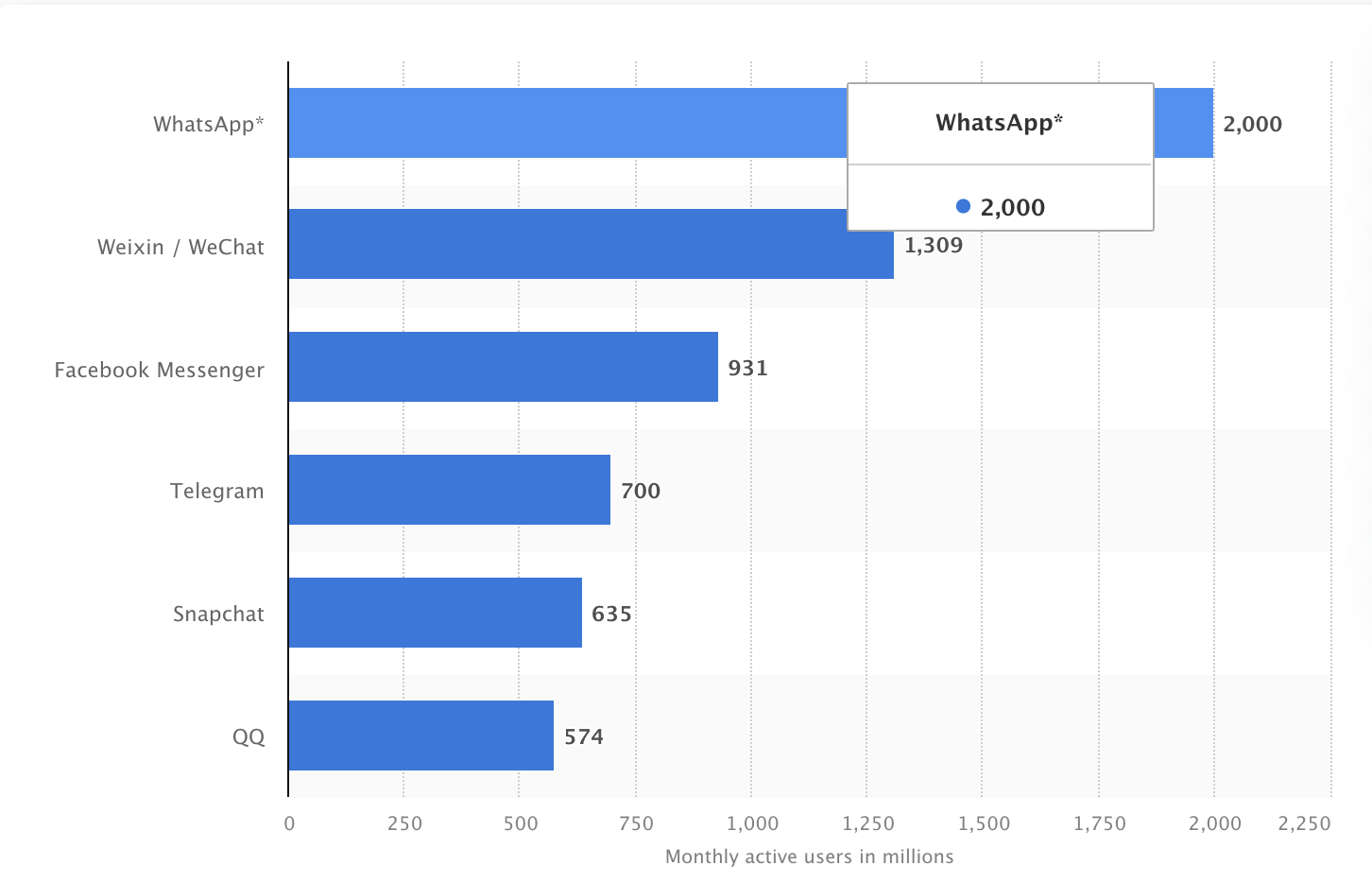
This growth offers developers a substantial opportunity to create new messaging apps that cater to specific niches or offer innovative features.
II. The increasing demand for privacy in chat and messaging apps
The increasing demand for privacy in chat and messaging apps is another big factor that makes it relevant and sensible to create a messaging app in 2025. The issue of data privacy has become more significant in recent years, particularly with the proliferation of social media and messaging apps. Users are becoming more aware of the potential negative implications of data breaches and unauthorized access to their personal information.
This concern has increased demand for messaging apps with stronger privacy features, such as end-to-end encryption, self-destructing messages, and anonymous messaging. Moreover, the recent controversies involving social media and internet companies like Facebook and Google have made more people skeptical of these large corporations' data-gathering practices, further amplifying the need for privacy in messaging apps.
III. The rise of conversational commerce opportunities
The rise of conversational commerce opportunities is another factor that makes it still sensible to create a messaging app in 2025.
Conversational commerce refers to using messaging apps or chatbots for commercial purposes, such as shopping assistance, product recommendations, and customer support. With the increasing popularity of chat and messaging apps, consumers are starting to favor this method of communication over traditional channels such as phone or email. In fact, according to a survey conducted by Facebook, 53% of respondents said they were more likely to shop with a business they can message directly. This trend creates a huge opportunity for businesses to enhance customer service and sales using messaging apps. Hence, building a messaging app that allows for conversational commerce can provide significant value to businesses and consumers alike.
Key Features to Include in Your Messaging and Chat App
The success of an application depends on downloads and user retention. Let's examine the essential features that will make an application downloaded many times over, while becoming regular go-to choices.
Seamless User Experience
To build a successful chat app, prioritize a seamless user experience through intuitive design, user-friendly features, and minimizing lag or latency issues that can frustrate users and drive them to competitors.
Advanced Security Features
Implementing advanced security features such as end-to-end encryption, two-factor authentication, and passcodes in a chat and message delivery app is imperative to secure sensitive information. Passcodes can be a simple yet effective security measure that can only be unlocked by authorized personnel, giving customers peace of mind about working with your business.
Customization and Personalization
Customization and personalization are key for businesses building brand loyalty through chat apps. Personalization can take many forms, from customized profiles to using customer data to provide targeted recommendations and proactive customer service. The more tailored the chat experience is to the customer's preferences, the more likely businesses are to build and maintain long-term brand loyalty.
Integration with Existing Platforms
When choosing a chat app for your business, it's essential to consider its integration with existing platforms like project management systems, CRM software, and email clients. This can improve productivity and efficiency by keeping all relevant information in one place and ensuring timely responses to important messages. Investing in such a chat app can save time and money and benefit business growth.
Analytics and Insights
A message delivery app with analytics and insights can provide valuable data on customer interactions, feedback, and inquiries. This data can help businesses make informed decisions, identify customer preferences, and plan promotional activities. Understanding your audience better can help create tailored experiences, optimize resources, and drive more efficient results.
Real-time Support
Real-time support is a must-have feature for any chat app used in a business context. It improves customer satisfaction, builds trust and loyalty, and drives sales and revenue. By enabling instant messaging and chatbots that respond to customers' queries in real-time, businesses can provide the quick responses customers demand, essential for creating a positive customer experience and establishing a solid reputation in the market.
Cost-Effective Features
Implementing a chat app with chatbots and group chats can improve efficiency, communication, and customer support while keeping business costs low. This can result in a streamlined and efficient business operation, saving money and increasing profits.
Step-by-Step Guide: Building Your Own Chat and Messaging App from Scratch
As a business owner, building your own chat and messaging app can greatly improve communication and engagement with your customers. Here is a step-by-step guide for building your own chat and messaging app.
Step 1: Determine the Scope of Your Messaging App
Begin by defining the scope of your project. Consider the desired features and functionality, identify your target audience and their specific needs, and tailor your app to meet those needs.
Step 2: Decide Which Platform to Use
Choose a development platform that suits your needs. Consider the features and functionality you want to include, such as iOS, Android, or web-based platforms.
Step 3: Build Your User Interface
Designing a user-friendly interface is crucial for building a message delivery app. Consider the visual design, colors, fonts, and layout to ensure users' ease of navigation and understanding.
Step 4: Build Your Application's Backend
This involves building server-side logic using a programming language and framework, such as Python and Django, and creating a database schema.
Step 5: Integrate Third-Party APIs
To improve your messaging app, consider integrating it with third-party APIs such as Google Maps or Stripe for location sharing and payments. Identify which APIs will add value to your app and integrate them into your code.
Step 6: Test Your App
Before launching your app, thoroughly test it to ensure it's functioning as expected. This includes testing the app's performance, security, and functionality. You can use tools like automated testing frameworks and manual testing to identify and fix any bugs or issues.
Step 7: Launch Your App
To launch your message delivery app, publish it on relevant app stores and promote it to your target audience. Monitor performance and user feedback, and make improvements over time.
Top Chat Apps and Their Cost of Development
There are several popular chat apps available in the market. The cost of developing a chat app depends on various factors such as the features, platform, complexity, and development team's experience. Below are some of the popular chat apps and their approximate development costs:
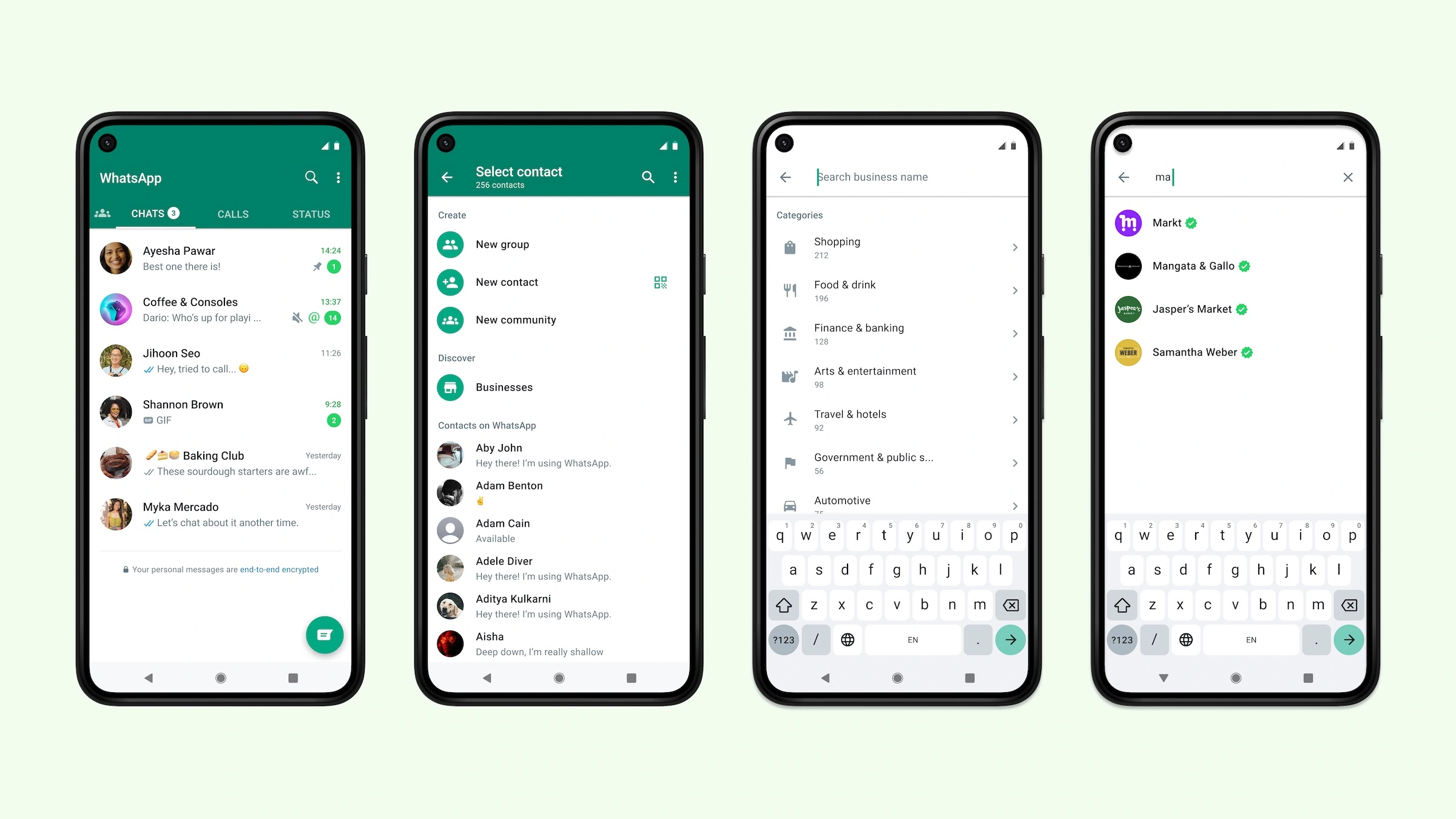
WhatsApp is a popular chat app with features like messaging, voice, and video calls.
- Cost of development: $45,000 - $55,000
- USP: End-to-end encryption for secure messaging
- Interesting fact: WhatsApp was founded by two former Yahoo employees in 2009, and was acquired by Facebook in 2014 for $19 billion.
Facebook Messenger
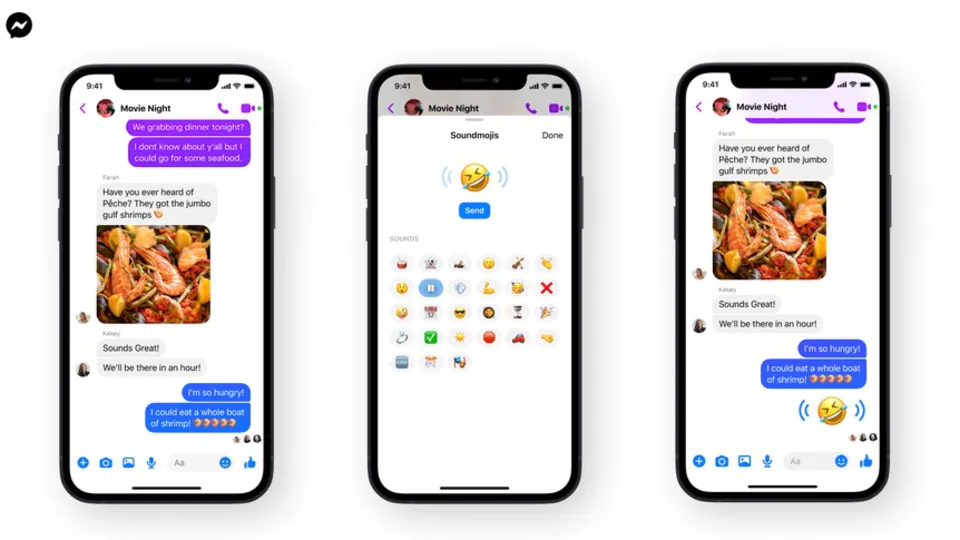
Facebook Messenger is a messaging app with features like messaging, voice and video calls, and chatbots.
- Cost of development: $50,000 - $60,000
- USP: Integration with Facebook's social network and business pages
- Interesting fact: Facebook Messenger was initially part of the Facebook app, but was spun off into a separate app in 2011.
Telegram
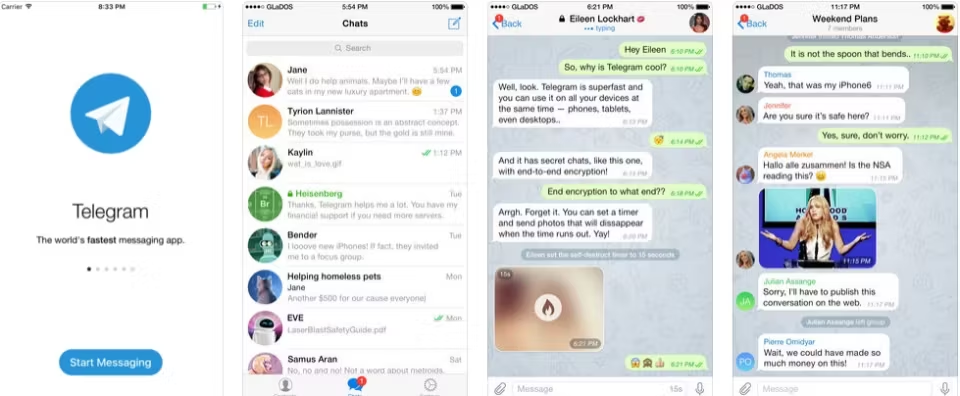
Telegram is a cloud-based messaging app with features like end-to-end encryption, self-destructing messages, and large group chats.
- Cost of development: $50,000 - $60,000
- USP: Self-destructing messages and secret chats
- Interesting fact: Telegram was founded by Pavel Durov, the founder of Russia's largest social network VK.
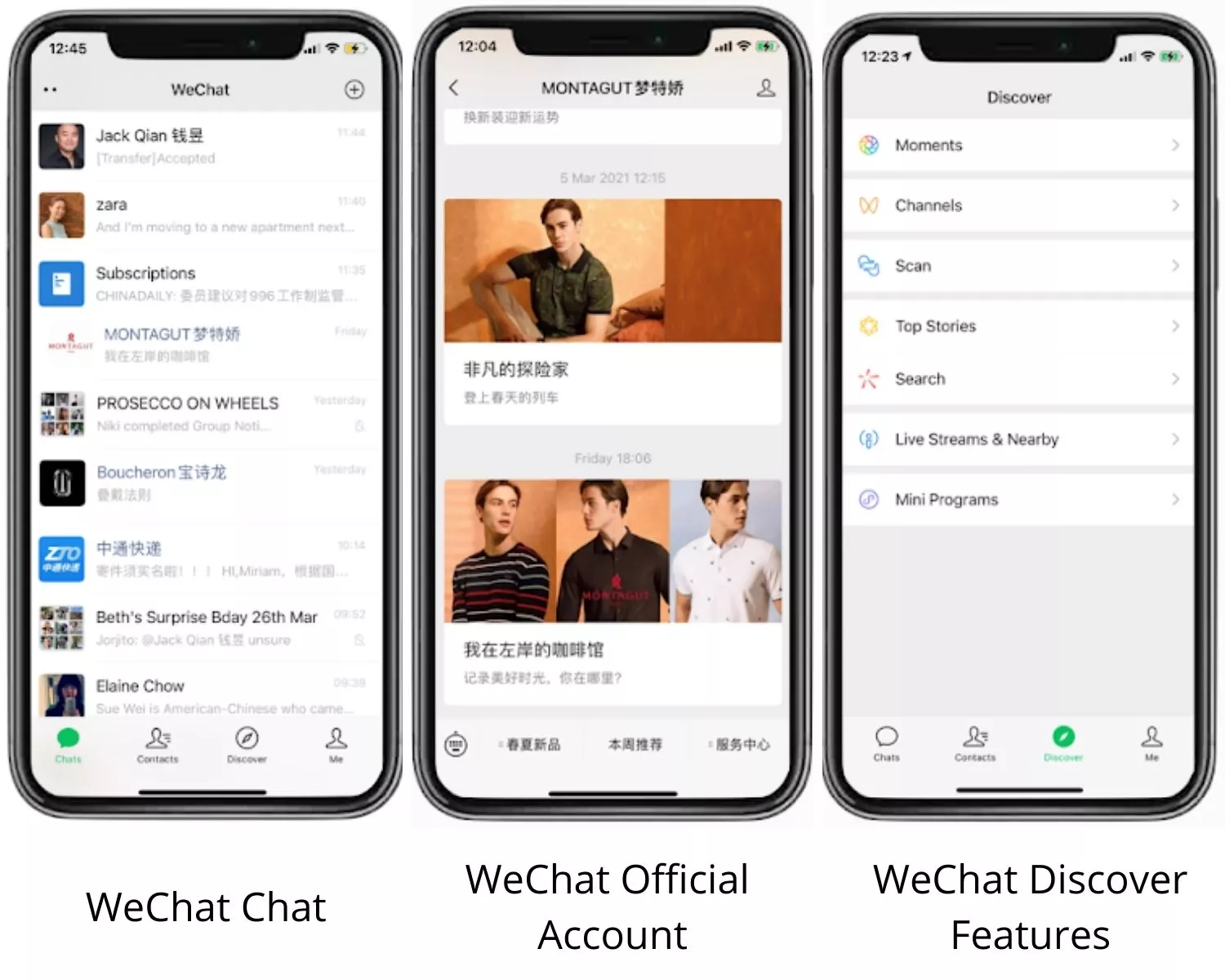
WeChat is a popular messaging app in China with features like messaging, payments, social media, and gaming.
- Cost of development: $60,000 - $70,000
- USP: Integration with popular Chinese services such as payments and ride-hailing
- Interesting fact: WeChat has over 1 billion monthly active users, primarily in China.
Signal
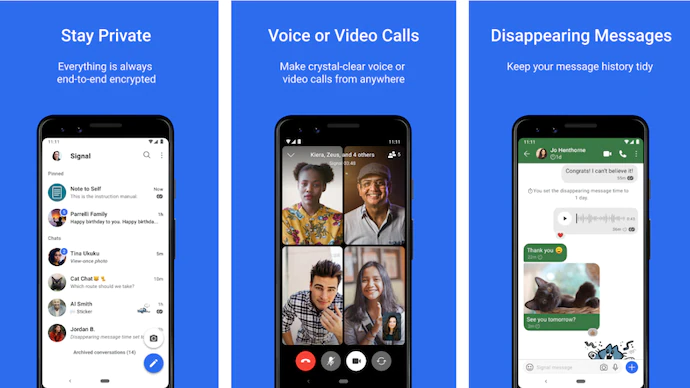
Signal is an open-source messaging app with features like end-to-end encryption, voice and video calls, and disappearing messages.
- Cost of development: $50,000 - $60,000
- USP: Advanced security features and privacy-focused messaging
- Interesting fact: Signal was initially developed by an independent non-profit organization, and is now owned by the Signal Foundation, a non-profit organization founded by WhatsApp co-founder Brian Acton.
Note: You can also communicate in real time via text, voice, or video using GeekChat. It can be customized to accommodate all your modern chat app requirements.
Challenges of Building a Chat App
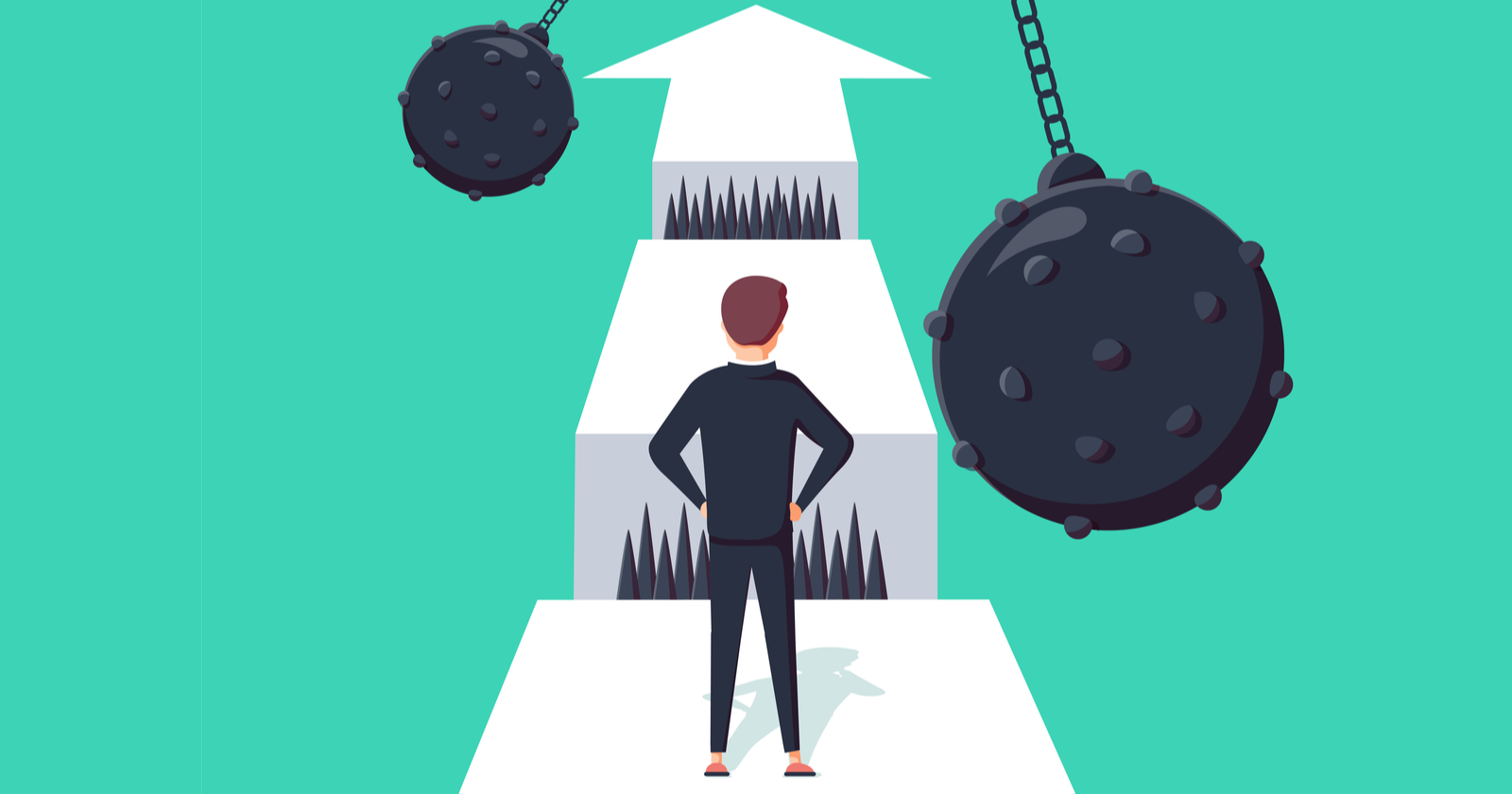
Before starting the development process for a chat and messaging app, it's important to consider the following obstacles and prepare for them accordingly. This will help prevent potential pitfalls and issues down the line when the messaging app is functioning.
Defining Real-Time Features
The messaging app industry is dominated by major players that have set high standards for competition. To be successful, a messaging app needs to offer more than just basic chat capabilities. After launching a minimum viable product (MVP), the app should be updated with features that satisfy user demands, such as custom fonts and stickers, chat muting, privacy status updates, video and voice calls, and file transfer.
Security Issues
Ensuring top-notch security and protection is crucial during messaging app development. It's important to prioritize personal data protection, message encryption, and building a secure project architecture. This can be achieved by implementing end-to-end encryption via protocols like XMPP, using cryptographic keys, planning a secure data storage architecture, including privacy policies, and developing additional functionality for messenger protection.
The Tool Stack
Choosing the right technology stack is essential to build a well-performing app—research existing apps and case studies to determine the best tech stack for your project.
Server Overload
As the number of app users grows, the app's server may become overloaded. Optimizing an app like WhatsApp requires a lot of technical expertise and skilled developers. Ensure that the server setup and capacity are appropriate and supported by proper hardware for quick scalability. Create a list of potential server bottlenecks and develop a precise action plan.
Flawless App Updates
Messaging apps must constantly process user data, making it critical to avoid losing existing data during new functionality deployment and app updates. Configuring servers and architecture is essential to prevent data loss during updates.
Stable Connection
Network loss can cause temporary disruption and result in losing the last message. Develop your messaging app with a reliable connection to ensure the app maintains a stable connection and reproduces lost messages during disconnection.
GeekChat — A Customizable Showcase App We Built
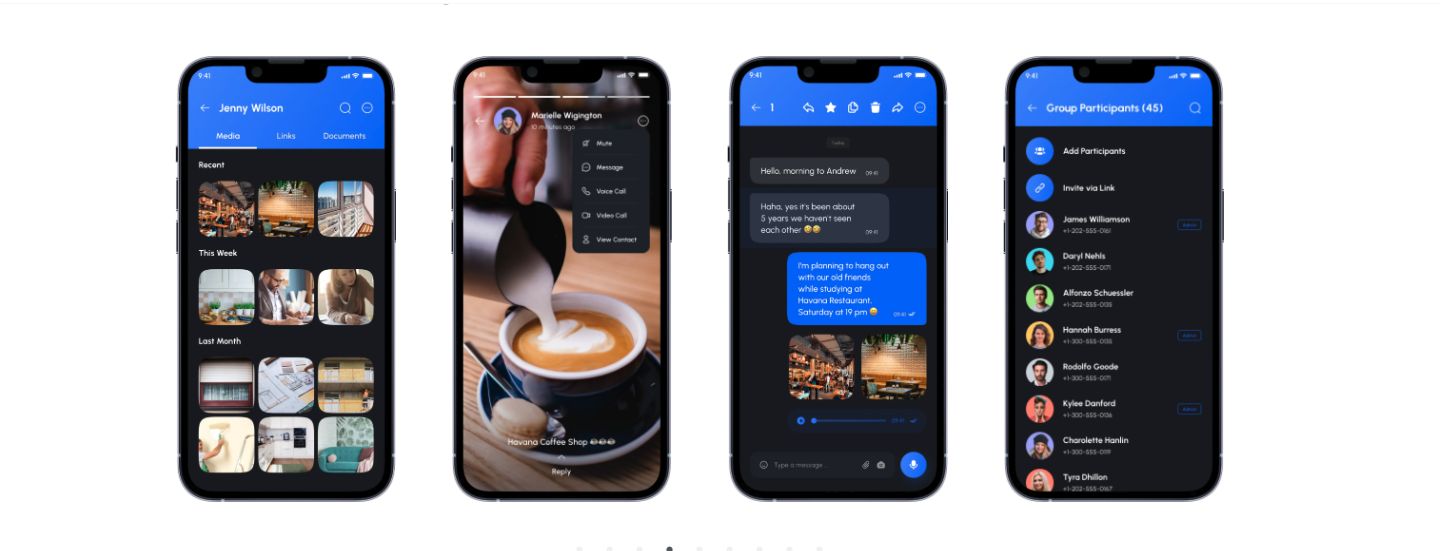
GeekChat is a customizable messaging and chat app that allows users to communicate with each other in real-time through text, voice, or video. It can be tailored to meet all your modern chat app requirements.
With features like multi-user authentication and 1:1 video chat capabilities, GeekChat is built using React Native, Firebase, and CometChat API. Check out this link to learn how GeekChat can benefit your business.
FAQs:
- How long does it take to build a messaging app like WhatsApp?
The time required to build a messaging app like WhatsApp depends on various factors such as the app's complexity, features, platform, and development team's experience. Generally, it can take anywhere between 6 months to a year to develop a messaging app like WhatsApp. - What Technology Stacks to use While Building a message delivery app?
The choice of technology stack depends on the platform, features, and requirements of the messaging app. Generally, the recommended technology stacks for building a messaging app include programming languages like Java, Python, Swift, or Kotlin, and frameworks like React Native, Flutter, or Ionic. - What is the primary objective of building a chat application?
The primary objective of building a chat application is to enable seamless communication between users. A chat application can also offer additional features such as voice and video calls, file sharing, and group chats to enhance user experience and engagement.



